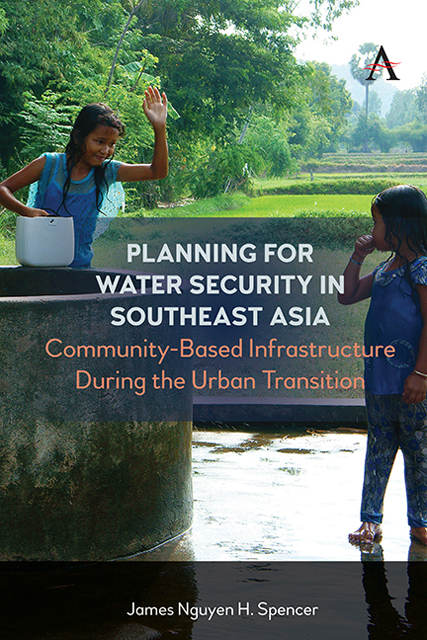 Planning for Water Security in Southeast Asia
Planning for Water Security in Southeast Asia Book contents
- Frontmatter
- Content
- Preface
- Introduction
- 1 Water and Human Security
- 2 Global Urbanization: The Confluence of Peri-Urbanization and Urban Transition
- 3 Community-Based Public Finance of Deep Well Water Systems in Peri-Urban Java
- 4 The Peri-Urbanization of Can Tho and the rise of Entrepreneurial Water Suppliers in the Mekong Delta
- 5 Ha Noi: Bulk Water Retailing in Peri-Urban Areas
- 6 Peri-Urbanization, Co-Production and Institutional Culture: The Case of the Phnom Penh Water Supply Authority
- 7 Beyond Resilience: Are we thinking about Entitlements, Participation and Governance in the Right Way?
- References
- Index
4 - The Peri-Urbanization of Can Tho and the rise of Entrepreneurial Water Suppliers in the Mekong Delta
Published online by Cambridge University Press: 10 January 2023
- Frontmatter
- Content
- Preface
- Introduction
- 1 Water and Human Security
- 2 Global Urbanization: The Confluence of Peri-Urbanization and Urban Transition
- 3 Community-Based Public Finance of Deep Well Water Systems in Peri-Urban Java
- 4 The Peri-Urbanization of Can Tho and the rise of Entrepreneurial Water Suppliers in the Mekong Delta
- 5 Ha Noi: Bulk Water Retailing in Peri-Urban Areas
- 6 Peri-Urbanization, Co-Production and Institutional Culture: The Case of the Phnom Penh Water Supply Authority
- 7 Beyond Resilience: Are we thinking about Entitlements, Participation and Governance in the Right Way?
- References
- Index
Summary
Like many countries in the Global South, Viet Nam is currently undergoing a major social and economic transition that has three primary components: market reforms, urbanization and increasing demands for public service amenities. These three components have combined to create a development paradox that has many state institutions scrambling to create and reorient traditional structures of governance to meet these demands in areas that are urbanizing quickly. The literature on institutions and urban service provision, however, provides scant evidence to suggest how such urbanization may play out in a context of rapid population growth where infrastructure currently does not exist—a defining characteristic of peri-urban areas. Many studies focus on the privatization of public services and the outcomes this institutional change has on the poor, assuming that these services are natural monopolies. These studies, however, overlook that in rapidly transitioning urban areas, multiple water sources may facilitate competition within the market—as opposed to for the market—and keep open viable economizing choices for the poor.
This case of the city of Can Tho's efforts to provide clean water to its new residents by partnering with local community-level entrepreneurs illustrates some of the ways that the state can participate in the kinds of service provision networks described in Gresik in Chapter 3. In a socio-political sense, the state becomes an organized collective hoping to help solve residents’ problems, but without any particular monopoly on trust. As one of several providers in this market, the state—as a relatively new player in this market—must justify itself as the provider of first choice.
In this context where no clear monopoly exists, and where residents have many options for service of a wide range of qualities and prices, the state is more of an innovator and educator trying to get people to pay for a new product than a monopolistic provider. This characteristic of multiple local “demand curves” (Spencer, 2008b) points out the central issue of building infrastructure that is embedded within an understanding of the water supply choices and alternatives available to locals. Because there are several local water supply alternatives in a peri-urban environment, the context differs greatly from both an urban one or a rural one.
- Type
- Chapter
- Information
- Planning for Water Security in Southeast AsiaCommunity-Based Infrastructure During the Urban Transition, pp. 95 - 126Publisher: Anthem PressPrint publication year: 2022
